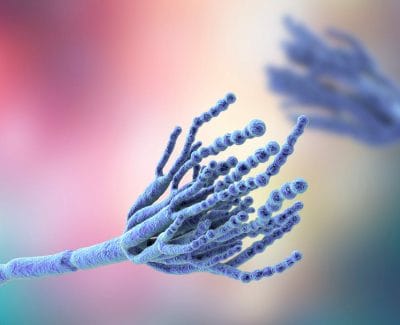What is fungus?
Fungi are plant-like creatures all around us, in the soil, our homes, and the air we breathe. Some fungi are good for us and keep us healthy. Most people with healthy immune systems are not affected by fungi. However, in rare cases, the fungus may cause inflammation in the nose and the sinuses (called fungal rhinosinusitis), just like having mold in the sinus cavity symptoms. Fungal allergies can also cause other allergic diseases like allergic fungal rhinosinusitis, which can have different symptoms and need different treatments.
Different types of fungal sinus infections:
Overall, fungal sinusitis can be classified into two categories: invasive and non-invasive. Non-invasive fungal sinusitis only stays in the sinuses and does not spread to other areas, while invasive fungal sinusitis can potentially spread to neighboring parts. Invasive fungal sinusitis is very rare.
Noninvasive versions include:
- Fungal ball, where fungus or mold collects in one or more of the sinus cavities. The fungus ball can eventually get big enough to block the sinuses.
- Allergic fungal rhinosinusitis is when you have an allergy to fungus or mold. There can be a lot of mucus buildup and sinus polyps can form.
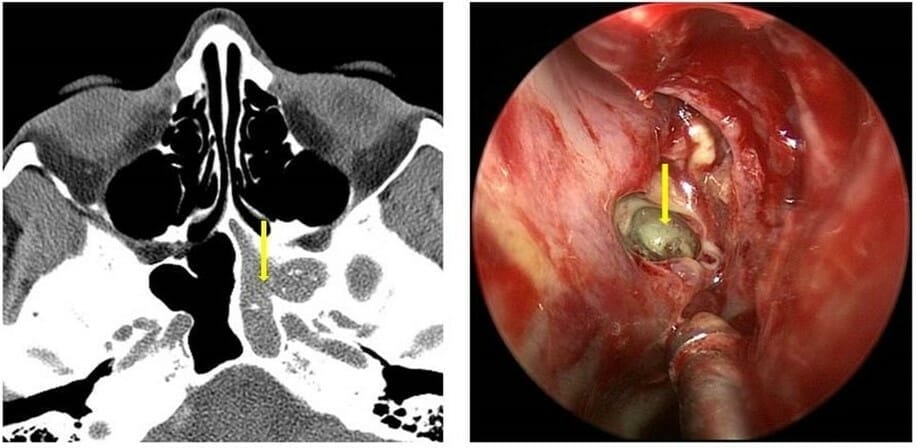
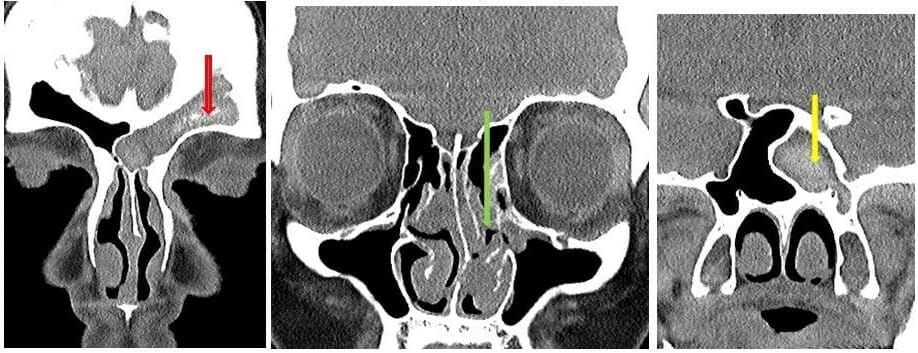
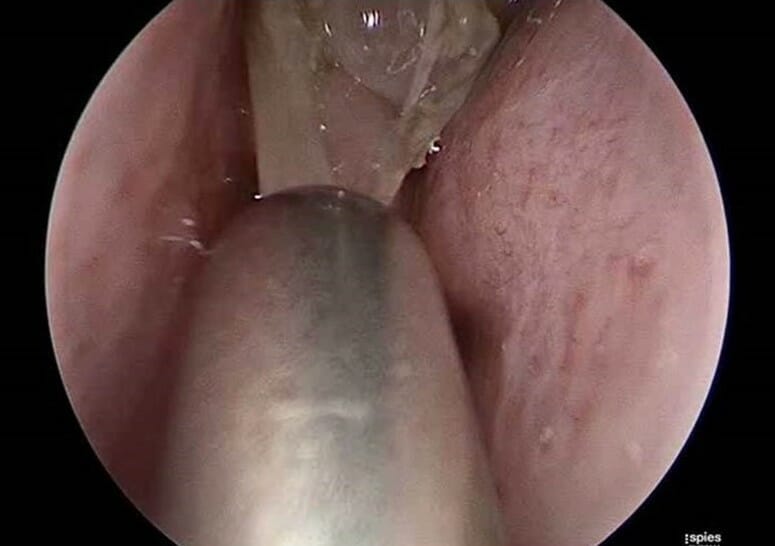
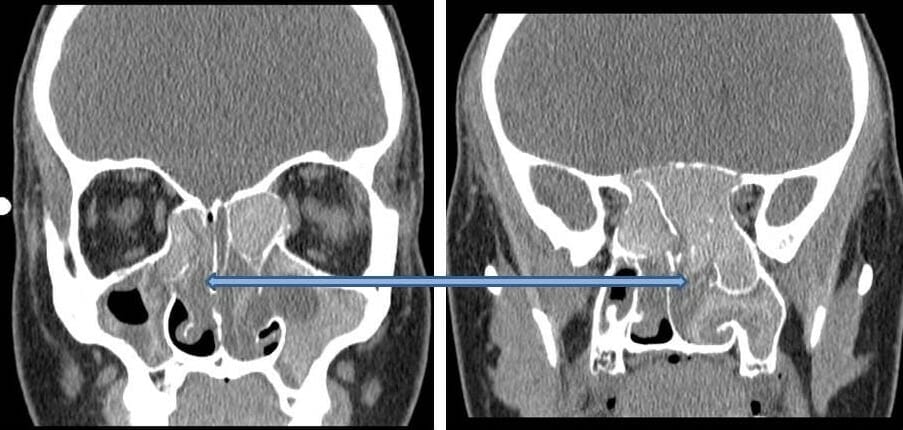
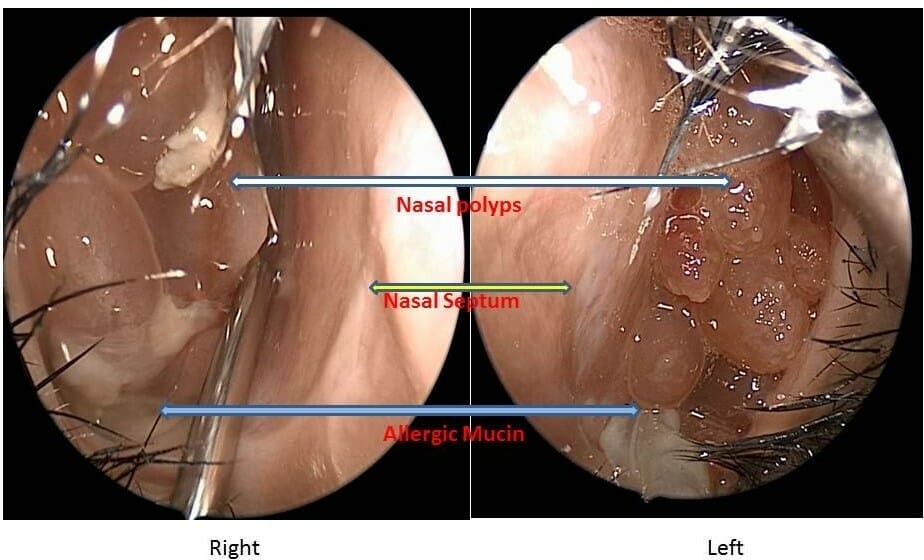
Invasive versions are very rare, but more serious. They include:
- Acute Invasive Fungal Sinusitis, where the fungus or mold spreads through the blood vessels into the sinus tissues and bones, roof of mouth, eye, and brain. Fortunately, it is extremely rare. It progresses quickly and can cause symptoms such as numbness in the face, double vision, blindness, and changes in awareness levels if it reaches the brain. It’s fatal 50% of the time, on average. It tends to strike people whose immune systems do not function well, such as people with poorly controlled diabetes with high blood sugars, people who are undergoing chemotherapy, organ transplant recipients, and people with immunodeficiencies.
- Chronic Invasive Fungal Sinusitis, where the fungus or mold invades the sinus tissue and bone but progresses slowly. It doesn’t cause many side effects or death, and it is usually found in people with normal immune systems.
- Granulomatous Invasive Fungal Sinusitis is similar to CIFS but with specific changes in tissues and the types of people it affects. It’s typically found in people with typical immune systems in North Africa, the Middle East, and Asia and can cause the eye to protrude or be displaced.
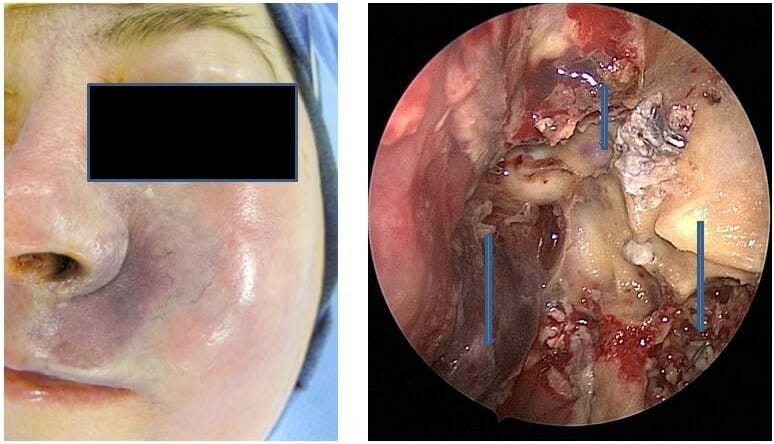
Symptoms of fungal sinusitis
These diseases usually have symptoms such as:
- Pressure or pain in the face
- Headache
- Nasal congestion or obstruction
- Discolored nasal drainage
- Foul-tasting postnasal drip
- Reduced sense of smell or taste (with allergic fungal rhinosinusitis)
Acute invasive fungal sinusitis symptoms are described separately above.
How fungal sinus infections are diagnosed
If a doctor thinks you might have fungal sinusitis, they will ask about your health and symptoms, look inside your nose and sinuses using a special camera (called a nasal endoscopy), and check how well your nerves are working. You might also need a CT scan or an MRI to check the extent of the disease. If you have allergic fungal rhinosinusitis, you might need a test to see if you’re allergic to mold.
If your sinus infection doesn’t improve with antibiotics or lasts for more than three months, you should see an ear, nose, and throat specialist.
How fungal sinusitis is treated
In cases of fungal sinusitis, surgery is often necessary to remove the fungus. The extent and urgency of surgery depend on the type of infection. Endoscopic sinus surgery is usually effective for non-invasive types of fungal sinusitis. Emergency endoscopic or open surgery is required for acute invasive fungal sinusitis, as it progresses rapidly and can be fatal.
After surgery, it is important to irrigate the sinuses regularly to keep them clean. The doctor may also prescribe steroids to reduce inflammation and antibiotics to treat co-existing bacterial infections. Antifungals are necessary for treating invasive fungal sinusitis and are not typically recommended in all other types of fungal sinusitis. Allergy shots may be recommended for allergic fungal rhinosinusitis.
The bottom line
Viruses or bacteria usually cause sinus infections, but sometimes, fungi can cause them. Fungal sinusitis needs to be treated with surgery, and sometimes, it is serious. A complete evaluation by your otolaryngologist will help determine if you have a form of fungal sinusitis and how it needs to be treated.
Links:
https://sinushealth.com/conditions/treatment-of-nasal-polyps/
https://sinushealth.com/conditions/adult-sinusitis/
https://sinushealth.com/treatments/nasal-endoscopy/
https://sinushealth.com/treatments/sinonasal-irrigations/
https://sinushealth.com/find-a-rhinologist/
https://sinushealth.com/conditions/anosmia-smell-and-taste-disorders/
https://sinushealth.com/treatments/endoscopic-sinus-surgery-2/
https://sinushealth.com/resources/anatomy/sinus-anatomy/

